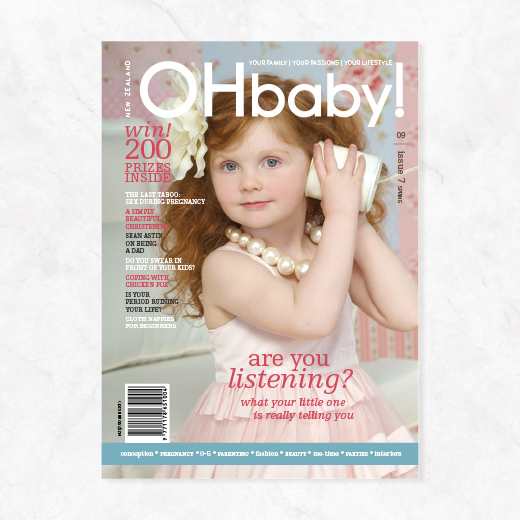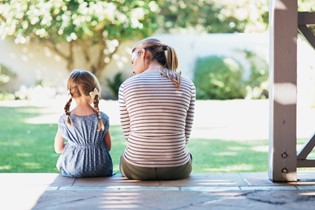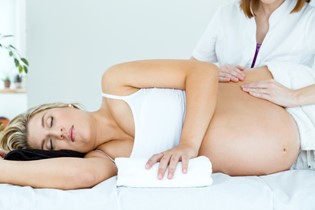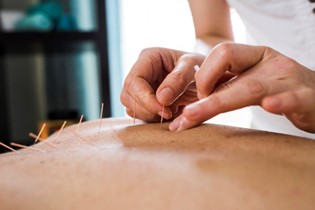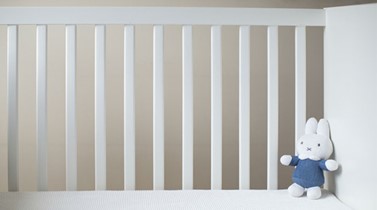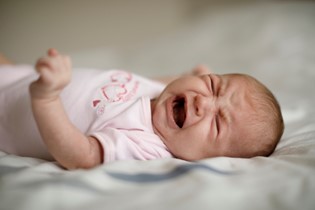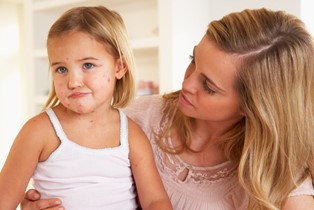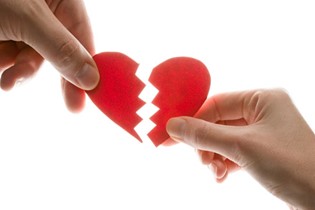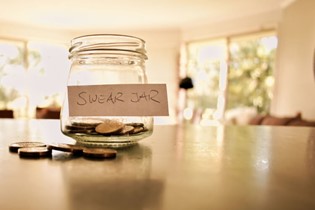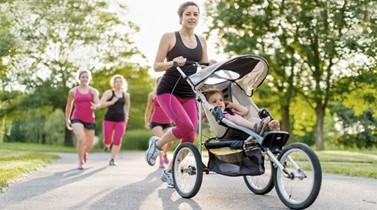Periods and exercise
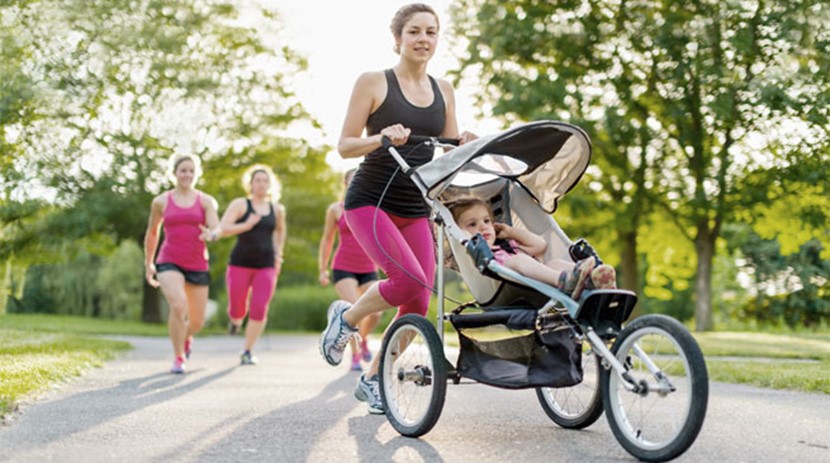
When you have your period, one of the last things you might feel like doing is exercising. But it's important to understand what's going on in your body so that you can avoid crashing on the sofa with the intentions of eating an entire tub of ice cream by yourself, explains Fiona Ross.
How many of us have heard our friends saying, "Next time, I'm coming back as a man!"? As women, we have the privilege of being able to bear children, something most mothers will agree is one of life's purest joys. But along with this honour, we must also deal with a few little "extras" - the most obvious being the dreaded monthly "curse".
Unfortunately, many women struggle with fear of disclosing their symptoms, or resign themselves to accepting these symptoms as "normal" when they're really not.
By understanding what is actually going on in your body and discussing common issues with other women of a similar age, it can be both enlightening and refreshing. You are not the only one!
Menstrual myths
Attitudes to women and their capabilities have changed quite dramatically over the years, but it wasn't that long ago things were very different.
In Victorian times, women were discouraged from running and leaping, as medical professionals of the day thought that athletics would damage the female reproductive organs, and that female runners would be unable to fulfll their womanly duty of conception and motherhood.
In the late nineteenth century, many arguments took place regarding women's "limited" physical and mental capacity due to their menstrual cycle. Influential medical practitioners, many of whom were men, used pseudo-scientific theories about the effects of a woman's menstrual cycle to define limits for their activities.
However, when Joan Benoit won the first Women's Olympic Marathon in Los Angeles in 1984, she ended a long era of protective attitudes towards women. She chose to push her body beyond moderation to its limits and risked a state of exhaustion in the sight of millions. She was an inspiration in the sport of women's running and a leader for many more women to follow.
But first, a lesson in physiology
Here's how your period works. A complex balance of hormones controls your monthly cycle and ensures that a mature egg is produced, and that the lining of the womb is able to support a fertilised egg. Two hormones are released from the brain (having been stimulated by another hormone), which in turn stimulates the ovaries to produce the hormones oestrogen (oestradiol) and progesterone.
These hormones have several functions, such as getting the eggs to ripen and the womb lining to grow/thicken, but may also be responsible for how we feel and respond to exercise during this time.
An average menstrual cycle lasts 28 days, but may range from 20 to 45 days. The menstrual cycle has two basic phases: The follicular phase, which commences immediately after menstruation, and the luteal phase, which occurs immediately after ovulation.
During the early follicular phase, both progesterone and oestrogen levels are low. Prior to ovulation, there is a marked increase in oestrogen levels. Ovulation produces the empty follicle known as the corpus luteum.
The corpus luteum secretes progesterone in an attempt to stabilize the lining of the womb, in anticipation of implantation of the fertilized egg. If this doesn't happen, both hormones drop sharply, causing menstruation to occur and then the whole process starts again.
How does this affect my ability to exercise?
During the follicular phase, our joints are more stable and injury risk is decreased. A lower internal temperature is noted.
During the luteal phase, there is an increase in body temperature, resulting in a lower ability to tolerate heat/sweating/stress and the possibility of a reduction in endurance performance. The body also uses more fat as fuel at this time.
During the luteal phase, lower intensity exercise is recommended, and longer recovery may be required. This hormonal cycle is unique to females, and oestrogen has been implicated as a risk factor in higher injury rates among females.
Some studies have shown a higher incidence of certain injuries (i.e. Anterior Cruciate Ligament) around ovulation, in the menstrual cycle but again continued research is required, as other studies have shown conflicting results.
What benefits does exercise bring for women?
* Improves cardiovascular health
* Improve bone density
* Maintenance of a healthy weight
* Prevention of obesity
* Reduction in stress
* Can help to reduce the severity of period pain, even relieving it completely in some cases
* Can help improve the symptoms of pre-menstrual tension (PMS)
* Can help in reducing the volume and duration of the menstrual flow
Women of various ages and stages of life surround me, and I am constantly amazed how some women put up with seemingly hideous symptoms without seeking guidance or remedies to relieve or assist them at these times. There are solutions, and implementing them in your life is a simple task which can have a huge positive effect on your feeling of wellbeing.
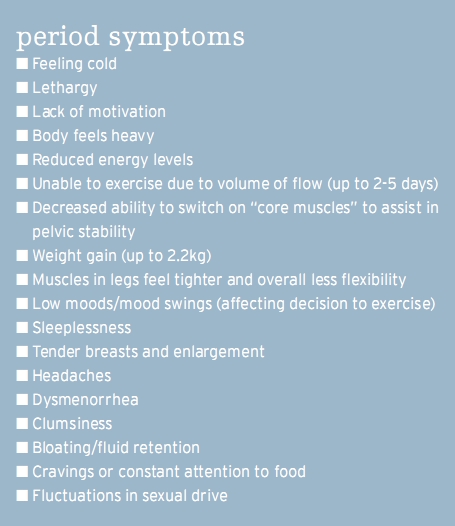
Looking for answers
Listening to your body is a start, and planning and accepting change is the first step forward. Many women feel a sense of increased calm when they finally accept their body for what it is, instead of constantly fighting with it. Here are some ways to start figuring out of what's going on:
* Record your menstrual cycle in a diary (for at least the next three months)
* Jot a few symptoms down and observe any patterns
* Remember that if you are breastfeeding and menstruating, your cycles are very likely to be irregular
* Prioritise some exercise time, either individually or with a friend/group
* Record your exercise as well, so you can look for patterns
* Eat small regular meals and try to choose healthy options in between meals
* Consider supplementing with B vitamins, calcium, magnesium or a women's multi-vitamin
* Stay away from convenience or highly processed foods as much as possible
* Reduce caffeine consumption
* Try alternatives such as soy milk in coffee or cereal
* Rest and adequate sleep is vital
* Avoid smoking if possible (seek help and make it easier)
* If you are going to drink alcohol, moderate your intake
* Get outside when you can and enjoy the natural Vitamin D
* Take time out - read a book, meditate or take a walk along the beach
* Always consider trying or investigating alternative therapies
* A soak in the bath followed by a massage can work wonders
* Laugh out loud at yourself, and learn to love yourself as a unique and special individual
* Don't completely deprive yourself of the things you enjoy, but maybe have just a small taste
After about three months, you should be able to establish a general pattern emerging, including both your symptoms and energy levels prior/during menstruation. This will make it easier to organise lighter activity at different stages of your cycle, consequently leaving you feeling less guilty or frustrated.
It is easy to try to avoid exercise and make excuses; however, thanks to increased endorphin levels, the overall effect after exercise results in a much more positive attitude/feel good factor and the ability to tackle anything!
Try not to fight and dread your menstrual cycle but enjoy the challenge and find what works for you! Each month may be slightly different depending on what is going on in your busy life, making some months a breeze, while other times it just all feels too hard.
Remember you are not alone and talking with a friend or colleague sometimes may enlighten you both to a better solution on how best to deal with these ongoing monthly challenges.
Women have a variety of tasks and activities to fit in to their daily schedule, so it is vital that each woman finds her unique balance and therefore how best to maintain her energy levels, even during those seemingly tougher times of the month.
Most importantly, if you are concerned about the severity of your symptoms then please do not hesitate to seek advice from you healthcare professional or general practitioner.
References
* Jutel, A. The New Zealand Woman's Guide to running: Beginner to Elite. Longacre Press ltd, 1995.
* Vertinsky, P.A. Menstrual disability and female physical capability: The eternally wounded woman. University of Illinois Press, 1989.
* Brukner, P. and Khan, K. Clinical Sports Medicine (3rd ed). Mcgraw-Hill, 2007.
* Ireland, M. l. "The female ACL: why is it more prone to injury?" Orthopaedic Clinics of North America, 33.4: 637-651.
Lisa Yates is a mother of two young girls and an experienced physiotherapist with a special interest in women's health. She is passionate about obstetric and continence physiotherapy and is also a women's personal trainer and wellness coach. Together with Fiona Ross, a mother of two teenagers, experienced midwife and personal trainer, she founded FiliFit Ltd to help nurture healthy lifestyles. The Core and the Floor DVD (available from www.filifit.com) is New Zealand's first post-pregnancy exercise programme designed by health professionals. This comprehensive DVD demonstrates everything you need to know to safely and effectively get in shape. Lisa and Fiona share a passion for educating and empowering women to "be the best they can be".

AS FEATURED IN ISSUE 7 OF OHbaby! MAGAZINE. CHECK OUT OTHER ARTICLES IN THIS ISSUE BELOW
